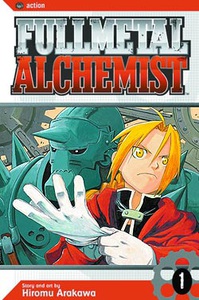Review
by Melissa Harper,Fullmetal Alchemist
G. Novel 1-3
| Synopsis: |  |
||
After losing their mother to illness, the Elric brothers were ready to give anything to bring her back, but the price was more than they could pay. The attempt left the older brother, Edward, with two false limbs, and the younger brother, Alphonse, with only his soul, which Edward grafted to a suit of armor. Broken and defeated, they have been searching for the one way to return their bodies, the Philosopher's Stone. However, every step they take towards the stone takes them closer to discovering the depravity of the world, and the weakness of humans. |
|||
| Review: | |||
Fullmetal Alchemist has every right to be among the most successful properties to hit the States in recent memory. The narrative power of Edward Elric's story rivals that of any literature currently in print. The journey he takes is action-packed, but is also filled with moments of humor, success, failure, warmth, and despair. All these things come together to make a story filled to its considerable depth with realistic moments and characters. The precision in storytelling here is ridiculously good. Arakawa knows exactly where she is going from the very first page, and what an excellent first page it is. Volume one opens with the lesson that is repeated constantly throughout the series: to gain something, something must first be given. It sounds simple, but every time this theme is stated, you are forced to think about it in new ways. The page that contains this message has been gray scaled from its original color version nicely, and depicts Edward at the moment he realizes that the attempt to resurrect his mother has gone horribly wrong, and has cost him his leg, and his brother. The rest of the story is revealed over the course of the volume; Edward then managed to trade one of his arms for the soul of his brother, which he put in a suit of armor. He then got “auto-mail” prosthetics, and set out in search of a way to get all of Alphonse back. The only lead they have is the Philosopher's Stone, so Edward joined the military in order to better search for it. The events in the first volume basically detail the exploits of the Elric brothers as they travel through the outskirts of the country. In each chapter, they meet with people who are being oppressed in one way or another, and then they manage to push the oppressor out of power, through interesting and usually hilarious methods of alchemy. It is almost misleading, in a way, because anyone reading the first volume would think that Fullmetal Alchemist is just another formulaic shonen series. They would be wrong. The formula drops almost entirely in the second volume; the goal of the first is really just to acquaint the reader with the dynamics of the Elric brothers: what their relationship is like, what their skills are, and how they handle different situations. It reveals the character of Alphonse to be more rational and passive, and Edward to be a bit hotheaded, but with a passion for setting things right. Volume two sets the story on its narrative tracks, and it steamrolls on forward, right into the psychologically gripping story of Shou Tucker, the Sewing-Life Alchemist, the only state alchemist to successfully create life that can speak. You will be thinking about this episode for quite a while after reading it, I guarantee. Volume two continues introducing new characters, including the whole gang of State Alchemists at Central. These characters are all wonderfully unique, an artistic feat seeming how they are all wearing the same uniform. Completely original, no clichés were harmed in the making of this cast. Each one has a distinct personality and character that is apparent right away. In volume three, the real depth of the story begins to show itself. Everything the brothers thought they were searching for is suddenly distorted, and their whole world shifts with it. Questions are raised, the implications of which are horrifying. What is a life worth? What does it mean to be alive? What does it mean to be human? Ed and Al discover some deep secrets of the military, and it turns out that the price of obtaining a Philosopher's Stone is much, much higher than they had anticipated. Visually, these graphic novels are interesting, at least. They'll be the shiniest books on your shelf, to be sure, as Viz has decided to match the title of the series with metallic covers for the books. Each one also comes with a spat of extras at the end, including a note from the editor, some hilarious short comics, and an “In Memoriam” panel of questionable taste that features the characters from that volume that have departed. The artwork is not astounding, but it's certainly original. Ed's facial expressions are probably the humorous highlight of the series, as he reacts quite violently to comments about his small size. Arakawa has a gift for movement; even the smallest moves the characters make come across clearly through her art. That said, the series is a little heavy on distortion, especially on distance shots. This adds to the humor of the series, but sometimes gives it a sketchy appearance. However, the story would be just as compelling if there were stick figures acting it out. The journey the reader takes along with the brothers over these three volumes is long and insightful. No other manga, and maybe no other book, on the bookshelf will leave you thinking like Fullmetal Alchemist. |
| Grade: | |||
|
Overall : A
Story : A+
Art : A-
+ Deep story, amazing characters. |
|||
| discuss this in the forum (36 posts) | | |||
| Production Info: | ||
|
Full encyclopedia details about |
||